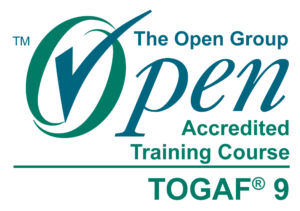
TOGAF® 9 Training Course: Level 1 and 2 Combined
This courseware is available in a Virtual Classroom configuration.
The TOGAF® 9 Training Course: Level 1 and Level 2 Combined is a classroom-based interactive learning experience. The course covers the curricula of both TOGAF…
Read More| Certificate | OGAF Foundation (Part 1) and TOGAF Certified (Part 2) | |
| Duration | 4 or 5 Days | |
| Delivery | Blended, Classroom, Virtual Classroom | |
| Accreditor | The Open Group | |
| Languages | English |
Please ensure your accreditation for this product. Find out how to get accredited.
What is included in TOGAF® 9 Training Course: Level 1 and 2 Combined
The TOGAF® 9 Training Course: Level 1 and Level 2 Combined is a classroom-based interactive learning experience. The course covers the curricula of both TOGAF Foundation (Part 1) and TOGAF Certified (Part 2) exams.
The Foundation (Part 1) certification provides validation that the candidate has gained knowledge of the terminology, structure, and basic concepts of TOGAF 9, and understands the core principles of Enterprise Architecture and TOGAF. The TOGAF 9 Certified (Part 2) content focuses on the practical application of TOGAF framework, building on the foundational knowledge and comprehension of Part 1, using practical scenarios to enforce concepts.
All new trainers who wish to deliver an Accredited Training Course must, prior to delivering an Accredited Training Course, be approved by The Open Group Certification Authority.
Available Courseware For TOGAF® 9 Training Course: Level 1 and 2 Combined
Instructor Package
Includes a slide deck suitable for Classroom and Virtual Classroom delivery, instructor notes to guide the trainer through the course delivery, and a version of the Coursebook.
Learner Coursebook
Coursebook with all the relevant information required for the learner to take and pass the exam.
Course Agenda
Sample agendas for running successful Classroom, Virtual Classroom, or Blended Classroom sessions.
Benefits Of Working With ITpreneurs
Ready-to-use training materials means faster time to revenue. Offer relevant training to your clients: order accredited training materials, book exams, and drive results.
Innovative Solutions
We continue to innovate our portfolio. We offer blended learning programs, video-based learning as well as interactive learning tracks.
Convenience
An intuitive ordering process and fully automated delivery portal that integrates with your own delivery processes make your life easy.
Instructor Support
You get extensive guidance for instructors, ensuring optimal deliveries, every time. Don’t have an instructor? Use one of ours!
Branded Products
Our printed books, ebooks, or printable books are branded with your logo and name. Your customers will log into your branded portal.
Tailored Portfolio
You get various flavors of courseware, ensuring there always is an option that suits your needs.
Click & Consume
A flexible pay-per-use model for courseware, exams and instructors offers you full flexibility instantly.
Partner with ITpreneurs for TOGAF® 9 Training Course: Level 1 and 2 Combined
Interested in licensing our courseware for your training organization or corporate training environment?
We really enjoy the way the courseware is structured, covering not only the theoretical aspects but also clear real-life examples.
Gabriel Espinosa
Service Desk Manager At City National Bank
